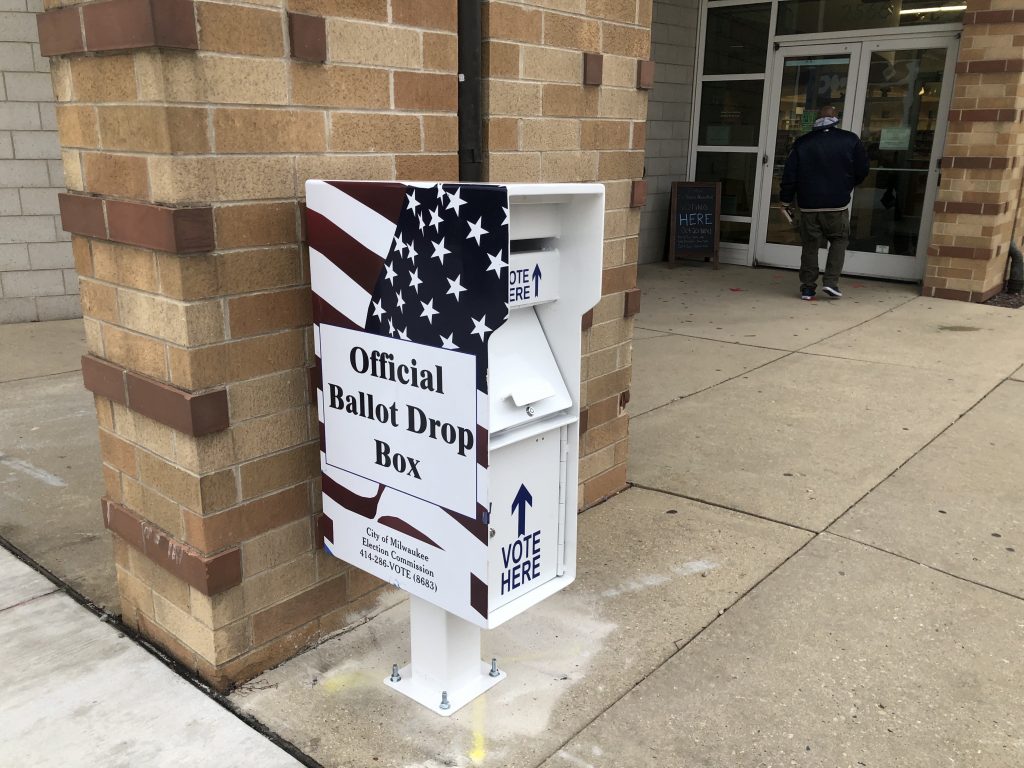Do Absentee Drop Boxes Lead To Tyranny?
So claims state Supreme Court in 122 pages of overheated rhetoric.

A ballot drop box outside the Bay View Library. Photo by Jeramey Jannene.
On July 8th of this year, the Wisconsin Supreme Court issued its decision on Teigen v. Wisconsin Elections Commission. The effect of the decision was to prohibit the use of drop boxes for the submission of absentee ballots.
No admirers of brevity, the justices managed to fill about 122 pages, including the opinion itself, along with three concurrences, while the dissent ran 18 pages.
She then proceeds to list a series of dictators, including Saddam Hussein, Kim Jong-un and Kim Jong-il, Raul Castro, and Bashar al-Assad. Personally, I find a president who refuses to acknowledge losing an election much more of a threat to democracy than an agency that issues guidelines for the use of drop boxes.
The crucial issue in this case seems to hinge on one’s interpretation of a single sentence in section 6.87(4)(b)1. of the Wisconsin statutes, concerning the return of absentee ballots:
The envelope shall be mailed by the elector, or delivered in person, to the municipal clerk issuing the ballot or ballots.
Bradley asserts (over many pages) that since drop boxes are not specifically included on this list their use is illegal. A more logical interpretation, it seems to me, is that a drop box is one way to deliver a ballot to the municipal clerk. Once I drop my ballot into the box, control of the ballot is transferred from me to the clerk (or to the election commission in the case of Milwaukee).
After all, when the statute refers to the “municipal clerk” it does not mean that the voter has to search out the actual clerk to submit his or her ballot. Otherwise, elections in Wisconsin’s larger municipalities would become impossible.
the only lawful methods for casting an absentee ballot pursuant to Wis. Stat. § 6.87(4)(b)1. are for the elector to place the envelope containing the ballot in the mail or for the elector to deliver the ballot in person to the municipal clerk.
Note that Bradley makes two revisions to the actual statute. The first is that her version requires the elector to deliver the ballot to the clerk. More importantly, she claims that the two methods listed are the only lawful methods of delivering the ballots. So far as I can discover, the statute doesn’t say that.
In addition to joining the Rebecca Bradley opinion, Justice Roggensack follows that opinion with a 13-page concurring opinion. It is unclear to my why she wrote it. She writes in her Conclusion:
I have written further to explain that, under Wisconsin statutes, it is the elector who shall mail the absentee ballot to the municipal clerk.
How would such a requirement ever be enforced? Should the government send out investigators to make sure that a voter is not delivering her husband’s ballot to the mailbox?
Rebecca Bradley returns again, with a 17-page opinion concurring with her lead opinion. This opinion was joined by Ziegler and Roggensack.
At first glance, the motive behind this concurrence is puzzling. It starts with a quote from John Adams’ Thoughts on Government and concludes with a scene from Henry VI. Since they are the same three justices who signed onto the plurality opinion, why didn’t they just park it there? But several themes emerge.
One is that they really, really hate the Wisconsin Elections Commission. The following quote gives a taste of their tone:
Second is that they want the Supreme Court to rerun the Trump v. Biden case, in which the four-member majority refused Donald Trump’s request to invalidate votes from Madison and Milwaukee, thus giving Wisconsin’s electoral college vote to him. The other three, the authors of this concurrence, agreed with Trump that the claimed violations were disqualifying, but left unsaid what would be the proper penalty.
Next comes a 34-page concurring opinion from Justice Brian Hagedorn. In it, he agrees that unstaffed drop boxes are impermissible, but disagrees with much of Rebecca Bradley’s reasoning behind that conclusion. Thus, there are four votes against drop boxes.
Despite arriving at the same destination, Hagedorn’s tone is a refreshing contrast to that of Rebecca Bradley. For example, he writes:
First, the election law statutes we are asked to consider are by no means a model of clarity. … Reasonable minds might read them differently.
By contrast, Rebecca Bradley makes it clear that minds which differ from hers cannot be considered reasonable.
Finally, the Justice Ann Walsh Bradley offers an 18-page dissenting opinion, which is joined by Justices Rebecca Dallet and Jill Karofsky. This opinion is a treat after the verbosity that precedes it, because of its clear reasoning.
It makes three arguments. First, that the plaintiffs don’t suffer any special injury from the use of drop boxes, generally a requirement for a plaintiff challenging a law to have standing. Second, that the statute refers to clerk not the “clerk’s office.” Thus by using a drop box, the voter is returning the ballot to the clerk. Third, that a prohibition on friends or family returning the ballot contradicts the statute’s use of “ballot or ballots.” This usage certainly suggests that a person could return more than one ballot.
In my opinion the decision to ban ballot drop boxes is a lost opportunity to make Wisconsin voting a bit more convenient and secure. Far more concerning, however, is the light it throws on the totalitarian instincts of three justices on the Wisconsin Supreme Court.
Data Wonk
-
The Imperial Legislature Is Shot Down
 Jul 10th, 2024 by Bruce Thompson
Jul 10th, 2024 by Bruce Thompson
-
Counting the Lies By Trump
 Jul 3rd, 2024 by Bruce Thompson
Jul 3rd, 2024 by Bruce Thompson
-
How Did Politics Affect Covid Deaths?
 Jun 26th, 2024 by Bruce Thompson
Jun 26th, 2024 by Bruce Thompson




















The biggest threat to our freedom are judges like Rebecca Bradley, Pat Roggensack, and Annette Zeigler. They regularly conjure up legal reasoning from any legal treatise that has been written in the last 2000 years in ways to justify the nullification of established government practices and established legal precedents. These actions end up giving more unchecked power to the gerrymandered legislature while taking power away from citizens and local governments. This interpretation keeps many persons with servers disabilities from voting which WILL advocates.
So anyone unable to get to the clerk’s office to deliver ballot has to mail it in. And if they miss that opportunity, and they can’t get to the clerk’s office because of disability, lack of transportation or more, they can’t vote. And how will this impact voters? Well, it seems reasonable to assume that those who have the resources will be able to find a way to get to the clerk’s office (taxi, family, friends, etc). Those who don’t have these resources won’t be able to do so. So more privilege for the wealthy and discrimination against the poor. This is not what our country is supposed to be about.